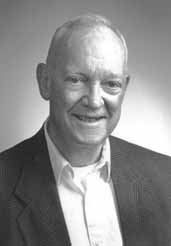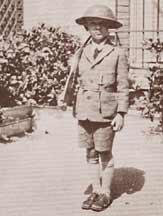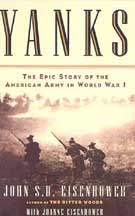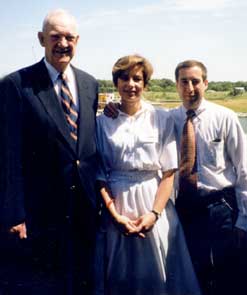|
|
 Maryland’s Eisenhower Maryland’s Eisenhower
This President’s Son is a Storyteller with Mitchell Yockelson
By 4:30 in the afternoon, I have answered more than a dozen calls to my reference office at the National Archives from family researchers who just learned that a great-uncle or grandfather served in World War I. They confess to not knowing much about his service and even less about the war itself.
My newly curious callers are not alone. The 1914–1918 European struggle, which the United States entered in 1917, stands alongside the Korean Conflict as one of America’s forgotten wars. It’s rarely studied in school and often overshadowed by larger conflicts such as the always popular Civil War and the ‘Good War,’ World War II.
Its heroes — John Pershing, Alvin York and Eddie Rickenbacker — are long forgotten. World War II will be commemorated, Congress has decided, with a long overdue memorial on the Mall in Washington, D.C. No such memorial exists for the veterans of World War I, though the First World War preceded the Second by more than 20 years.
As the number of World War I veterans still alive diminishes — less than one thousand survive — their war’s days of remembrance have lost their mark in our memories. Did you know that we celebrate Veterans Day on November 11 because on this date the allies and Germany signed an armistice to end World War I?
Yet World War I touched America as deeply as better remembered wars. More than four million Americans served from 1917 to 1918 in the ‘War to End All Wars.’ Half shipped overseas to France as the American Expeditionary Forces and served on the Western Front. Some 62,000 of the Doughboys, as the British and French soldiers affectionately called the Americans, came from Maryland. Many were attached to the 79th Division, which fought gallantly in the war’s last offensive, particularly the deadly assault on Montfaucon. The American Expeditionary Forces also sent troops to the United Kingdom, and some Doughboy regiments fought in campaigns as far away as Italy and Russia.
This month marks the 83rd anniversary of the United States Army’s first full-scale offensive during the First World War. Before that operation, the Americans had fought as part of the British and French forces. The successful attack on the St. Mihiel Salient proved that the United States was indeed a force to be reckoned with and a worthy opponent of the persistent German Army.
Yanks
Ultimately my many callers will ask me to recommend a good book on the United States in World War I. I tell them they can’t do better than Yanks, the engaging new narrative by Maryland historian John Eisenhower.
Yanks derives from a British nickname for American soldiers that’s as old as the Revolutionary War. If the Eisenhower name sounds familiar, then you might guess that John is the son of the World War II hero and two-term president of the United States Dwight D. Eisenhower. John and his wife, Joanne, live on the Eastern Shore in Trappe.
During a warm summer afternoon, I sat down with John for lunch at one of his favorite restaurants, Hemingway’s on Kent Island. Later we moved to his office in Easton to discuss his eighth book, Yanks. If you have never seen John before, it is impossible not to notice the striking resemblance to his famous father. But it is his own warm and easy-going personality that keeps your attention.
From Fact to Fiction
I first met John Eisenhower in 1988 when he came to the National Archives in Washington to promote his fifth book, So Far From God. At that time it was a quick hello and a treasured autograph. Eleven years later John called me at my office at the National Archives, where I specialize in the records of the U.S. Army in World War I, to discuss his latest project, which would become Yanks. I jumped at the chance to work with John Eisenhower.
Q Let’s talk about your craft as a historian and how you began your research …
A Quite often I don’t know much about the subject when I begin to write. I do this on purpose because I write for my own entertainment, and I like to learn something new. What I do, first of all, is get a previously published book on the subject and read through it and get a feel for the subject before I can make a complete outline.
Then once I make an outline and a table of contents, I take one phase at a time. I do not try to research the whole book before writing it. I take one episode at a time and then research the next episode, then so on and so on.
Which I suppose makes [me] a little bit inefficient for some writers who do all the research first. I can’t do that. I have horse blinds on. I can only think of one subject at a time.
I lean very heavily on individual autobiographies. I’ll admit they are self-serving, but if you want to tell a story, they are more colorful then the official reports and orders will be. After all, I am trying to write for a general reader, one who is amenable to reading about military history.
One rule I am stringent on is that I have to understand something before I write on the subject. Now that sounds silly, but too many military writers take an order or after-action report and just quote the darn thing without knowing what is going on. They appear to not understand what it means. If I don’t understand what the report means, then how do I expect someone else to, just because I quote from it? That is my one Holy Grail, so to speak.
John and I met at the Archives, toured the reference stacks and developed a research plan to guide him through the voluminous files of the United States Army that document World War I.
Q Tell me how the idea came about to write Yanks?
A I consider myself not a historian but a storyteller. Almost a biographer of the U.S. Army.
I have covered everything with the exception of the Civil War, which I don’t want to bother with because it has been covered so well.
My Winfield Scott book, Agent of Destiny, covered all the way from the War of 1812 to the Civil War. Allies was World War II, as was The Bitter Woods. So Far From God covered the Mexican War, and Intervention was the chasing of Pancho Villa.
I edited a book on the Revolutionary War, but it was so complicated that I don’t want to bother with it. I also haven’t done anything on the Vietnam War; it was also pretty complicated and I don’t really have a yen for that.
But with Yanks — after all I walked over those battlefields as a kid with my father — it was sort of a logical thing to do.
 Q Do you remember traveling with your father to France when he was writing the Battlefield Guide for the American Battle Monuments Commission? Q Do you remember traveling with your father to France when he was writing the Battlefield Guide for the American Battle Monuments Commission?
A I was only six years old at the time. I remember going to Verdun. I still have a brass ashtray with Verdun on it. Verdun was scary. We went to Compiegne to see the train where the signing of the armistice took place. I also remember Montfaucon and Romagne. I never realized they were five miles apart. I used to think that they were on different planets. Of course we had to have lunch at the site of the Lost Battalion. What a site that was. Almost vertical.
Told through the eyes of a Doughboy, Yanks is the story of how the U.S. Army grew from a meager strength of only 120,000 when we declared war on Germany in April 1917 to a fighting force of more than four million by the armistice in November 1918.
It took almost a year before the first division of Doughboys was trained, equipped and eventually transported to France.
Q Did you return to the battlefields before beginning research on Yanks?
A No, but I was in Belgium for two and a half years, and the last weekend I went to Ypres. For some reason or another, I had no plans to go to the American battlefields. They are not marked very well. You have to know what you are looking for to go to the American battlefields.
Q Of course that was the idea of writing the battlefield guide your father co-authored?
A Yes, and you know that holds up. I used it when I was reconnoitering for Yanks. Except that we got in a little trouble in one place where the town was expanded and sort of moved over and the road was not quite the same.
Led by General John ‘Black Jack’ Pershing, the American Expeditionary Forces turned the tide of a stalemated war.
As Eisenhower so convincingly proves, without the United States, the Allies would not have won the war.
Q Do you think it is important to walk the battlefields when you try to write about the First World War?
A I think that for your own comfort you should walk the battlefields. But I write the text first by using the old maps. It is just the way I am, but I am not very good at going somewhere without having significant knowledge of the place first.
This was the case when I wrote The Bitter Woods. I was young then and when I look back, it was quite a job. But by the time I finished writing the text, I did not need a map at all when visiting the Bulge territory. It was all in my head.
The Doughboys proved their mettle during the ferocious battles at the French villages of Cantigny, Belleau Wood, Chateau Thierry and the final offensive of the war, the terrain known as the Meuse-Argonne. More than 53,000 American soldiers lost their lives on the Western Front.
Q Does this cause you to change what you’ve already written?
A I change very, very, little. But I feel so much more comfortable about it.
I think that the best battlefield on earth in being absolutely the way it is supposed to be is Buena Vista, Mexico. Even the washed-out gullies are still there.
Yanks also introduces the officers who would become household names in World War II. George C. Marshall, Douglas MacArthur, and George Patton were among the many who made a name for themselves in the First World War. Dwight Eisenhower was also a young officer in World War I, but the war ended before he received an assignment with the Expeditionary Forces. Instead, Eisenhower trained members of the newly established Tank Corps at Camp Colt, Pennsylvania.
Q You have studied the U.S. Army through the War of 1812, the Mexican War, World War II. Do you see parallels between the American Expeditionary Forces and the fighting forces during those wars?
A The Navy is always a continuum, but it seems to me we just have new armies almost every war. We keep a small officer corps, which used to be supplied by West Point, though now it is less so. After the Civil War, then World War I, the Army has always cut back. So the armies in our history are all very different, except for the continuing strain of the officer corps during the various conflicts.
 Q Before starting to write Yanks, had you any pre-conceived beliefs that were changed? Q Before starting to write Yanks, had you any pre-conceived beliefs that were changed?
A Nothing surprising. Although I found the people more interesting than I expected to. They were more individual. General George C. Marshall, who was the boss during World War II, looked around and saw how old the division commanders were. So division commanders in the Second World War were 10 years younger then those of the first world war because of what Marshall saw.
But even those old codgers in their 60s … Joseph Dickman was supposed to have read and written five languages so that he could translate the military writing of each language. Hunter Liggett was terribly overweight, but a very sharp, astute tactician. Pershing was, in some ways, the least interesting of all of them. But he was a very stubborn guy. A very tough martinet. He was what we needed. Tasker Bliss was such a scholar that when he went to take his exams for West Point he took along a book of Greek. There was a lot of room for individuality in those days.
Patton started with the tanks during World War I and became involved with some antics that may have been a precursor to his personality in World War II. MacArthur pulled all sorts of daring deeds that, on second thought, may have been stunts instead of useful actions. The individuality was a very nice thing.
World War II could have been avoided, Yanks argues, if the U.S. Army under Pershing were allowed to destroy the defeated German Army, instead of granting an armistice while the enemy was still occupying French and Belgian territory. As we know, the German military slowly rebuilt its forces and initiated the next world war 20 years later.
Q Do you think there are lessons readers of Yanks may come away with?
A I think the obvious lesson is the cost of unpreparedness. But I think that there is only so much you can do to train for battle ahead of time. At the time we entered World War I, we only had about 200,000 men.
During the Second World War, we were much more prepared. I don’t know any example during World War II that compares with the 79th Division during World War I in the fact that much of the division had not even fired their rifles, and then were charged with the assault on Montfaucon. To me that is the ultimate sacrifice.
Q Are you happy with Yanks?
A I am very happy with the reception. Because even though World War I is lesser known than World War II, it has got its experts. And there is always the concern that one of these experts is going to say that [I haven’t] told anything new.
And I haven’t. I have just tried to make it more readable and clear than previously published books. That is the only basis in which I could compete.
The Making of a War-Story Teller
Q Were you a reader as a child?
A Yes, I read quite a bit. I don’t know how much compared to other kids. After all, I was an only child and I had a room in the back of the apartment that was all mine and I had lots of books. I don’t ever remember being bored.
Q Were there particular books that your father encouraged you to read?
A There was a biography of George Washington that was given to me. I read the Books of Knowledge a lot. My dad was particularly fond of a book by Arthur Conan Doyle called The White Company. It was a book about a company of troops commanded by a Captain White during the Roman period. Dad liked that. He read it over every now and then.
Q How about your study of history at West Point?
A West Point had a pretty good military history course. It was part of the Department of Military Art and Engineering. It was a survey course, and a little thin as it left out an awful lot. They were trying to concentrate on wars that had lessons to them. I look back on that course with a lot of pleasure. It was one of the few academic courses at West Point that I learned anything.
They started out with notes on combat maneuvers by the Greek armies. Then they skipped from Greece and Rome to Napoleon, where they spent a lot of time. Also the Civil War is where they spent a lot of time as well, and the rest on World War I.
World War I certainly had a big influence on the curriculum. I entered West Point only 23 years after the armistice. I don’t think a lot of people realize how short an interval it was between the two wars. I think that people who regard the two as the same war have got something there.
I was at West Point during World War II, so of course there was no course on that conflict.
Five months after John entered West Point, the United States entered World War II. Dwight D. Eisenhower was assigned to the War Plans Division under General George C. Marshall. During the summer of 1942, the elder Eisenhower was sent overseas as a theater commander and was eventually placed in command of the Supreme Headquarters, Allied Expedition Force, the command that planned and led the invasion forces to liberate Europe on June 6, 1944, D-Day.
Q Did West Point plant the seed for you as a military historian?
A It certainly did. But there wasn’t enough time to cover everything. Afterwards, when I left West Point, I found out that I didn’t really know as much as I thought I did. So I started reading and teaching myself. West Point really does, to a large extent, try to cover so much to let you know what your deficiencies are so that you can start studying when you leave.
One thing about West Point, they really teach you how to budget your time. I graduated in 1944. It was a four-year class cut down to three because of the war.
John Eisenhower’s class graduated on June 6, 1944, the same day as thousands of allied troops crossed the English Channel during the Normandy Invasion, which we now know as D-Day. After the graduation ceremony, John was escorted to the New York Port of Embarkation and placed aboard the Queen Mary for assignment to his father’s staff in England.
He remained on active duty in the U.S. Army for another 19 years, including a year in the Korean War. While still an army officer, John served on the White House staff of his father, the 34th President of the United States.
He has served as an editor of his father’s memoirs and as the ambassador to Belgium under the Nixon Administration.
 At Home on the Bay At Home on the Bay
John Eisenhower with fellow WWI historians Lisa Budreau and interviewer Mitchell Yockelson, (Right).
Q Tell me about your connection to the Eastern Shore of Maryland. When did you come to the area?
A I was living alone in Pennsylvania for seven or eight years when I came down here and bought the home in Trappe as a weekend place. I used to fly down to the area. I moved here in 1986. I was originally interested in St. Michael’s and hadn’t realized that there was more to Talbot County when I found Trappe.
It is quite a county. Very tight knit. We go to dinner anywhere in the county and think of it as being in our hometown. It is quite relaxing here. Where we live it is like wilderness. A few miles off the road. No one pays attention to my ancestry. I plan on staying the rest of my life here.
I also have a place in Washington for a change of scenery.
Q What is your next writing project?
A I am starting work on a book about Anzio. One of my criteria is that my father not be involved in my books, and he did not take part in the Italian Campaign in World War I. But it is a very dramatic story. It had lots of controversy, colorful people, but it was a bad idea.
Even though there are other books on the subject, my goal is to tell the story better than anyone else. Most military history is not geared as much toward the general reader as I am. I am a story teller.
Yanks by John S.D. Eisenhower and Joanne T. Eisenhower: The Free Press, 2001.
Learn more about U.S. participation in World War I in writer Mitch Yockelson’s evening class at Anne Arundel Community College continuing six Thursdays from September 20: 410/541-2510 (college). 301/713-7250 x 260 (instructor).
Copyright 2001
Bay Weekly
|